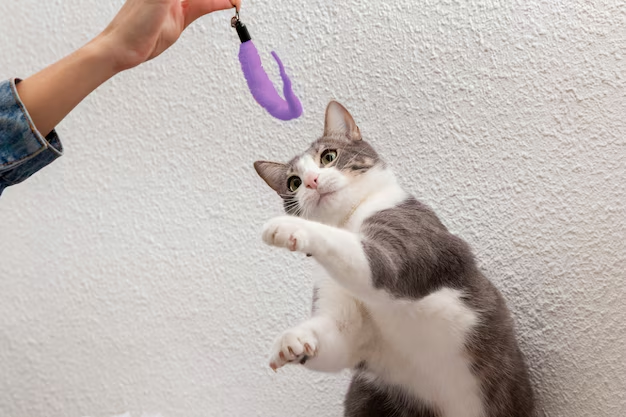Understanding Feline Play and Play Aggression | Express Vets Plus

Play is an essential part of every cat's life. It provides physical exercise, mental stimulation, and a way to bond with their human companions. However, sometimes playful behavior in cats can become too rough, leading to what is known as "play aggression." Understanding the difference between normal feline play and play aggression is crucial for ensuring a harmonious relationship with your cat and preventing unwanted behavior. At Express Vets Plus, we're here to help you better understand your feline friend and guide you in managing their playful energy.
Feline play typically mimics hunting behaviors. You'll notice your cat stalking, pouncing, chasing, or even swatting at toys or objects. These activities are natural and necessary for their development and well-being, especially for kittens and young cats who are learning the skills they would need in the wild. Play allows them to release their pent-up energy, hone their reflexes, and explore their environment. It's a joyful expression of their instincts and can even help relieve stress.
However, when play turns aggressive, it can be alarming and even painful. Play aggression is characterized by sudden pouncing, biting, scratching, or attacking, often directed at a person or another pet. This behavior is most common in young cats and kittens, especially those who were not properly socialized with other cats or humans. They may not understand that their rough play can hurt, or they might not have learned how to moderate their bite strength. Cats also often engage in play aggression out of boredom or frustration, especially if they lack sufficient outlets for their energy and natural hunting instincts.
The first step in managing play aggression is recognizing the signs early on. Watch for warning behaviors, such as dilated pupils, flattened ears, a lashing tail, or tense body posture. These can all indicate that your cat is becoming overstimulated and may soon shift from playful to aggressive behavior. It’s important to remember that your cat is not being "mean" or "bad"—they are simply expressing their instincts in a way that feels natural to them.
One way to manage play aggression is by providing plenty of appropriate outlets for your cat's energy. Interactive toys, like feather wands or laser pointers, are excellent for channeling their hunting instincts and keeping them engaged without putting your hands in harm's way. Puzzle feeders or treat-dispensing toys can also help provide mental stimulation and reduce boredom. Make sure to vary their toys regularly to keep things interesting and maintain their enthusiasm for play.
If your cat tends to bite or scratch during play, it's essential to avoid using your hands or feet as toys. Instead, redirect their attention to a suitable toy. If they do become overly aggressive, calmly withdraw your attention and stop the play session immediately. This helps them learn that rough behavior leads to an end of fun. Never punish or shout at your cat, as this can increase fear and anxiety, potentially worsening aggressive behavior.
Creating a calming environment can also be helpful. Cats are sensitive creatures, and stress or changes in their environment can lead to increased play aggression. Provide them with safe spaces, such as high perches or quiet corners where they can retreat and feel secure. Make sure their basic needs, such as food, water, and litter boxes, are easily accessible and maintained.
If you find that your cat’s play aggression is persistent or escalating, consulting with a veterinarian or feline behaviorist is a good idea. At Express Vets Plus, we are here to help you understand your cat’s behavior and provide you with personalized advice on managing and reducing aggression. Together, we can ensure your cat feels comfortable and content in their home environment, reducing stress for both you and your furry friend.
Remember, every cat is unique, and some may require more patience and understanding than others when it comes to managing play aggression. With the right approach and the right tools, you can help your feline friend express their playful side in a healthy and enjoyable way for everyone involved.
If you need help managing your cat's play aggression or have concerns about their behavior, contact Express Vets Plus today at (678) 493-5288 or visit us at 1428 Towne Lake Parkway, Suite 105,Woodstock, GA 30189. Our team is here to support you in creating a happy and harmonious home for you and your furry friend.



















